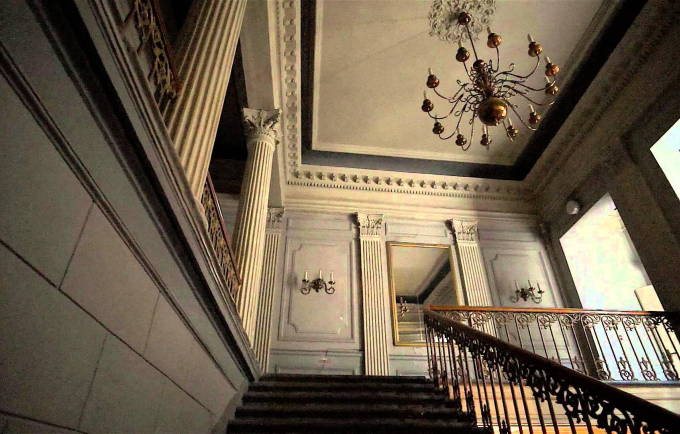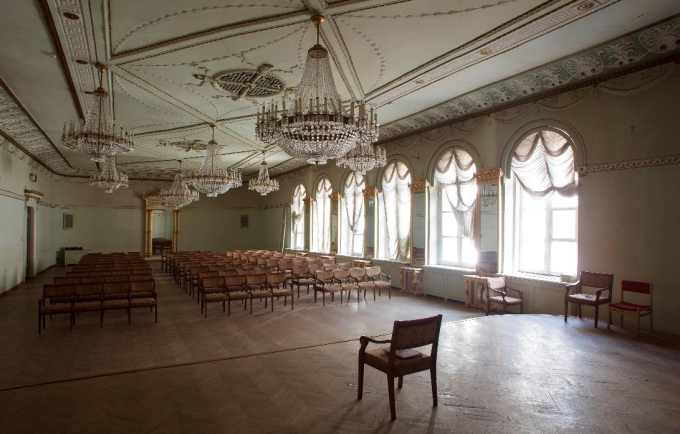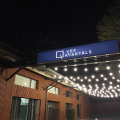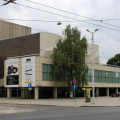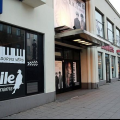Wagnersaal – this noteworthy Riga building was called by such a name from the time period between the years 1988 and 2007, when a functioning concert hall was located on the top floor. In reality this building, that has had its own, no less significant meaning in the life of the great German composer, appropriately deserves to be called by another name –
The Richard Wagner Opera Theater House.
German theater troops in Riga, the largest city in the Baltic region, have been active since the first part of the 18th century. One of them was supported by Baron Otto Hermann von Vietinghoff, merchant and patron of the arts, since 1768. He built the first stationary theater house in Riga in 1782 – the Stadt-Theater. This theater was built in the classical style, was erected between the city wall (later to become Wallstraße or Wall Street) and the street today know as Richard Wagner Street, and it still stands in the very center of the city on the edge of the historic Old Town, with the address Richard Wagner Street 4.
For nearly a century this theater house, home to the activities of dramatic theater, opera and ballet troops, was the center of cultural life in Riga. Already in its first decades, as far as repertoire is concerned, this theater house went in step with the best theaters in Europe, especially German theaters, and was the venue for concerts given by countless European virtuosi. The true flourishing of operatic art in Riga began after the building was reconstructed during the latter part of the 1830ies, when the young Richard Wagner worked there as conductor from 1837-1839. During his time in Riga he staged five different operas, led approximately 20 W. A. Mozart, C. M. von Weber, L. van Beethoven, G. Rossini, F. Auber and other opera productions, conducted orchestral concerts, especially focusing on the symphonies of L. van Beethoven. It was in Riga that the twenty-five year old Wagner matured into an artist of large style, composed his first full-scale opera Rienzi and, having observed ancient folkloric traditions of the local people, received stimuli to explore mythological themes.
Especially significant is that the specific characteristics of the Riga Stadt-Theater hall have inspired Wager, as he later admitted in an interview concerning the specific construction of the Beirut Theater. The specifics were three: angling of the parterre in the form of an amphitheater, dimming of the house lights during performance, and lower placement of the orchestra (orchestra pit), all of which were innovations in opera houses at that time.
In 1863 the theater troop moved to a newly built, more spacious building, utilizing the earlier building for storage, library and other needs. The former playhouse hall was reconstructed and built over numerous times. Much later, in 1988, the upper floor, which housed the German Social Club “Musse” until WWII, was renovated and the dance hall adapted for chamber music concerts. However, concert performances were discontinued in 2007, due to the worsening technical condition of the building, and to this day the building stands empty and abandoned.
The State Joint Stock Company that manages this property since 2006, in cooperation with the firm HANZA PROJEKTS Ltd., has completed an examination and analysis of the technical condition of the building in 2011 and follow-up in Autumn of 2012. Their conclusions once again reaffirm the cultural, historical and artistic value of architectural details that should be restored, as well as the unsatisfactory condition of the building’s foundation and weight-bearing structures. Yet, in spite of the study’s recommendations to stabilize and reinforce the building’s foundation, it has not been done. The rebuilding and restoration of the Riga Castle, official residence of the President of Latvia after it destroyed by fire in 2013, as well as other urgent construction projects impede the allocation of government funds in the nearest future as well.
To this end in 2014, when we note the passing of 175 years since Wagner left for Paris, marking the end of his Riga period, we have founded the public to uphold the social awareness of Riga as one of Wagner’s cities, to promote the cultural historical significance of the theater building itself, to develop a vision for the future functionality of the building once it is renovated, and to procure financial support first and foremost to resolve the problems regarding the stability of building foundation, after which the rebirth of the entire building shall be addressed.




